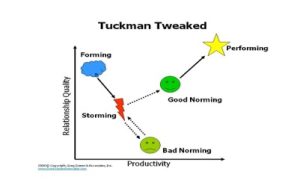The new and improved model

The Forming Stage
As you can see in Figure 1, the forming stage often includes an initial level of excitement and anticipation among team members. This accounts for the artificially high positioning of the forming stage on the Relationship axis. However, don’t be fooled; it is too early to see people’s true personalities or group dynamics. It is very common for team members in the forming stage to be on their best behavior with one another. In fact, typically there is little disagreement at this stage, let alone much testing of individuals or the team leader. This is because in the forming stage team members are still assessing the team and their role within it.
It is also possible for an experienced team in any of the advanced stages to return to forming, particularly when there are changes in team membership, or changes in the roles within the team.
What teams want to know in the Forming Stage
- There is a plan and they have a role within that plan
- Specific performance expectations
- How they fit in within the group
- Rules of group membership
- A competent team leader is leading the group
Once teammates are comfortable with one another over a period of time and have clarity on their roles, responsibilities, and tasks, they naturally will gravitate towards the next stage: storming.
What could prevent a team from moving beyond Forming?
- High turnover
- No effort given to building relationships
- Infrequent meetings
- Virtual team with little to no interaction
- Micro-managing team leader fosters a dependency on him/herself
- Team members primarily work independently of each other
- Immature teams
- No direction or leadership
The Good Norming Stage
What teams want to know in the Good Norming Stage
- Team members can build on their successes from the storming stage
- Team members can continue to raise issues and address disagreement and conflict
- The team leader’s level of trust and confidence in the team grows, giving way to a coaching and empowering leadership style
- Team members are able to take on greater roles and responsibilities within the team
- There will be a continued commitment to teambuilding, and ongoing efforts to enhance relationships
- New and exciting challenges await the team as it moves forward
- The team and team leader are committed to moving on to the performing stage
What could prevent a team from moving beyond Good Norming
- Comfort level with the present team atmosphere or unwillingness to “rock the boat” by bringing up new concerns or problems
- Team leader eases up on continuous improvement efforts
- Team members are not invested in becoming a high-performance team
- Individual efforts and accomplishments gradually become more important than the efforts and accomplishments of the team
The Performing Stage
It’s important to note that reaching the performing phase doesn’t mean smooth sailing forevermore. A team can experience a stormy period at any time—when it’s under unusual pressure, for example, or when things aren’t going as well as expected. The team may even temporarily return to the forming stage if it adds or loses members or when roles change. But what distinguishes a team in the performing stage from other teams is that they have the experience and the first-hand knowledge of what it takes to move through each stage in order to get back into performing. And what’s more, they are able to apply those lessons to any challenge or setback they may face.
What teams want to know in the Performing Stage
- Team leader is willing to delegate and further empower team members
- There is a team and organizational commitment for ongoing professional and personal development
- Team members are willing to take on greater responsibility within the team
- New and exciting challenges will continue to come their way
What could prevent a team from staying in the Performing Stage
- A significant change in membership, i.e., an influential member or the team leader leaves
- An unresolved conflict emerges that divides the team
- Team structure gives way to a more traditional work group format
- New team leader takes over and does not gel with the team
- Team feels neglected or abused by the organization
The Ending Stage
Tuckman later added a fifth phase, adjourning, that involves completing the task and breaking up the team. I prefer to use the term ending since adjourning infers that the team has decided to call it quits. In reality, a team can experience an ending at any time, and not necessarily by their own choosing.
What teams want to know in the Ending Stage
- Reason(s) the ending has occurred
- What happens next
- There is an opportunity to celebrate and/or put closure on the team
- Lessons learned are explored
- The team’s contributions were appreciated by the organization
What could prevent a team from having an effective Ending Stage
- The team experiences an abrupt ending with no closure
- Lack of communication between the team leader and the team about what happens next
- Failure to assess the team’s performance and lessons learned
- Lack of appreciation
Some final thoughts
The purpose of the Tuckman Tweaked model is to provide an additional framework for analysis and discussion on group development. I want to emphasize that this is a fluid model; meaning that teams can move back and forth through the various stages. It is also a dynamic model where a team as a whole could be in one stage while a subset within the team could be at an entirely different stage. This is why team members may not always agree as to which stage their team is currently residing.
Smith, M. K. (2005) ‘Bruce W. Tuckman – forming, storming, norming and performing in groups, the encyclopedia of informal education, www.infed.org/thinkers/tuckman.htm. Last updated: November 16, 2006.
